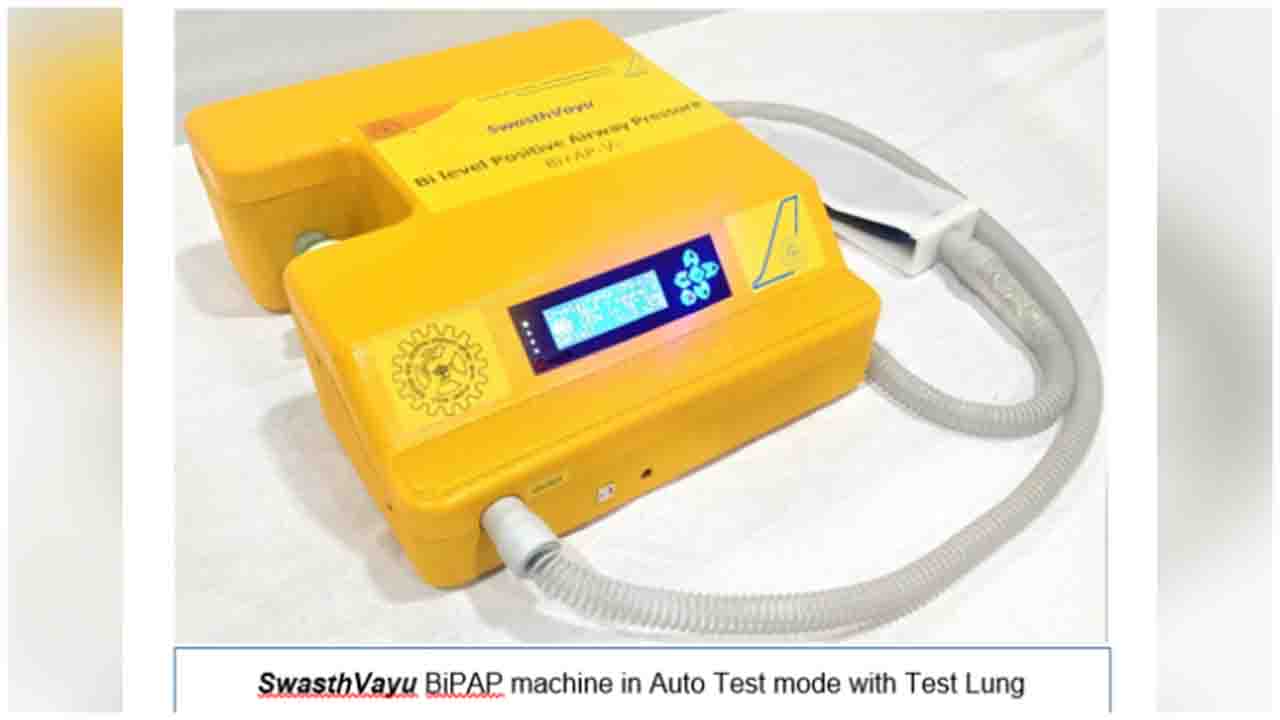CSIR – National Aerospace Laboratories Bangalore, a Constituent of Scientific and Industrial Research (CSIR-NAL) has developed a Non-Invasive BiPAP Ventilator in a record time of 36 days to treat COVID-19 patients.
BiPAP Non-Invasive ventilator – SwasthVayu developed by CSIR-NAL is a microcontroller-based precise closed-loop adaptive control system with a built-in biocompatible “3D printed manifold & coupler” with HEPA filter (Highly Efficient Particulate Air Filter). These unique features help to alleviate the fear of the virus spread. It has features like Spontaneous, CPAP, Timed, AUTO BIPAP modes with provision to connect Oxygen concentrator or Enrichment unit externally.
The system has been certified for safety and performance by NABL accredited agencies. The system has undergone stringent biomedical tests and beta clinical trials at NAL Health Centre.
Director NAL, Shri Jitendra J. Jadhav stated that based on global experience and specific inputs from Pulmonologist colleagues in India and abroad, NAL developed BIPAP Non Invasive Ventilator with externally connected Oxygen concentrator will be ideal to treat moderate or mid-stage severe COVID-19 patients who do not require intubation and invasive ventilation. This is ideal for treating COVID -19 patients in Wards, Make shift Hospitals, dispensaries and home in current Indian COVID 19 scenario.
The success is the culmination of efforts of a team of technocrats and medical practitioners under the leadership of Dr. CM Ananda- Head Electronics Deptt, Dr. Amarnarayan D-Chief Medical Officer-NAL, Dr. Viren Sardana–Respiratory Physiologist – IGIB and team of scientists at NAL who have worked relentlessly during Covid-19 restrictions. CSIR NAL has enabled a spin-off technology based on its expertise in the aerospace design domain.
The major advantage of this machine is, it is simple to use without any specialized nursing, cost-effective, compact and configured with the majority of indigenous components. CSIR-NAL is in process of taking it forward with the regulatory authorities for the approval and expected to get shortly. CSIR-NAL has already initiated dialogues with major public/private industries as a partner for mass production.
Recently, CSIR-CMERI, Durgapur, unveiled the COVID Protection System (COPS) for Workplace as a game-changer in the current Pandemic Scenario. Prof. (Dr.) Harish Hirani, Director, CSIR-CMERI, Durgapur, while unveiling the COPS for Workplace conglomeration of technology at a Press Conference held on 17 th July 2020, stated that “Apart from the Healthcare Workers, the frontline Security Guards of any organization are also very vulnerable to COVID through infected individuals and contaminated objects. CSIR-CMERI, Durgapur, in the near future will be developing a Digital Entry Management Systems whereby workflow would be automated and would be based upon Artificial Intelligence and the Internet of Things.
The COPS for Workplace includes contactless Solar Based Intelligent Mask Automated Dispensing Unit cum Thermal Scanner (IntelliMAST), Touchless Faucet (TouF) and 360° Car Flusher are now available for Technology Transfers and Product Orders.”Dr.Hirani further stated that “CSIR-CMERI, Durgapur, aims to support and align the Start-Ups and
Entrepreneurs while developing its technologies to give a boost to their aspirations and give them a platform to showcase their Innovative potential. CSIR-CMERI is also focused upon developing products Made in India, which will consequently boost the Atmanirbhar Bharat flagship initiative of the Government of India”.

 CSIR at the forefront of innovations designed to combat the pandemic
CSIR at the forefront of innovations designed to combat the pandemic










.jpeg)











.jpg)








